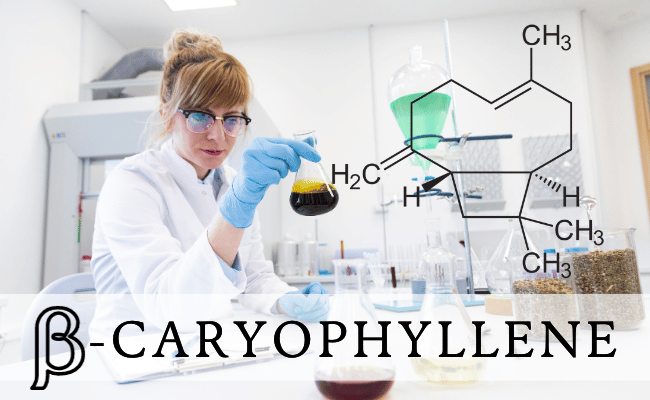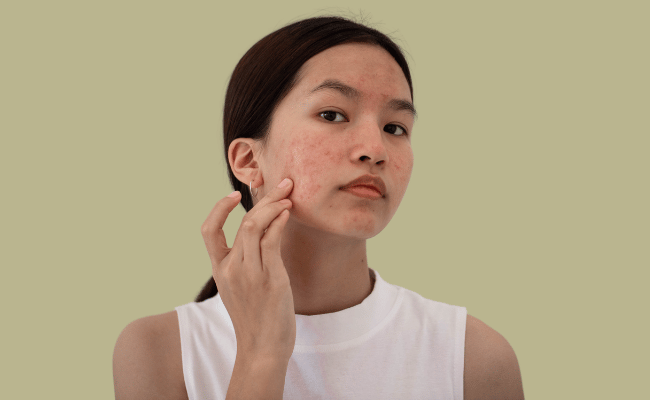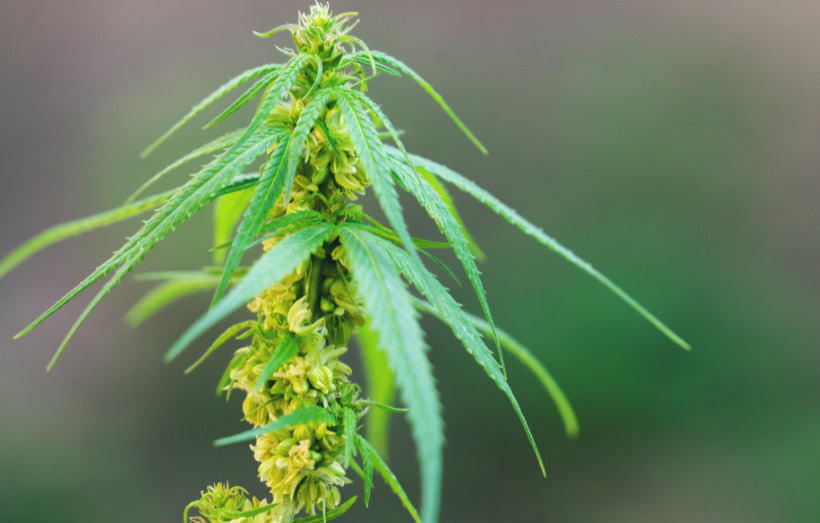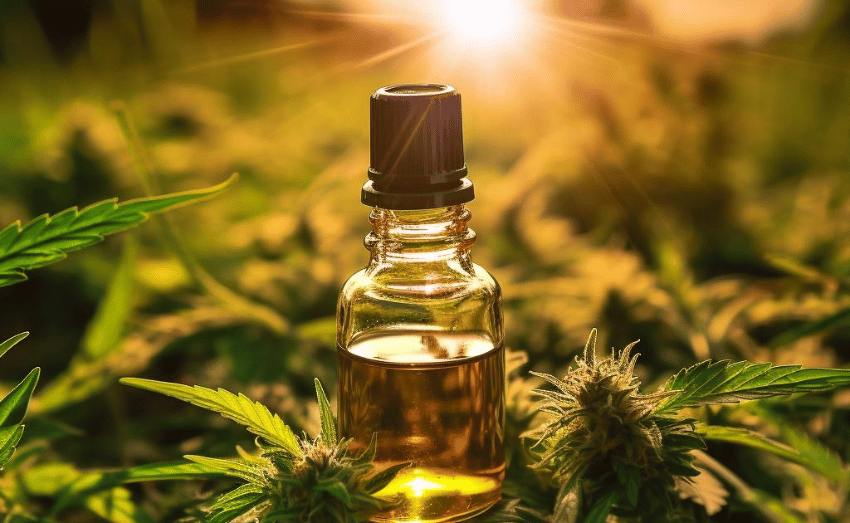Acne, the 8th most prevalent disease, affects about 9.4% of the population1, with teenagers being the most susceptible group. In fact, acne affects 85% of people between the ages of 12 and 24.2 This skin ailment, primarily caused by excess oil, bacterial infection, and inflammation, has been a significant concern for both dermatologists and those it affects.
Enter hemp seed oil, which, according to various reports, may offer a promising solution.
Derived from the seeds of the hemp plant, hemp seed oil, when cold-pressed, emerges as a vivid green oil often described as having a taste reminiscent of almonds or walnuts.
This oil, notably, does not contain THC in concentrations more than 0.3%, meaning it lacks the psychoactive properties often associated with marijuana. Thus, it stands distinct from CBD oil, which is another derivative of the hemp plant.
Composition and Benefits of Hemp Seed Oil for Skin
Hemp seed oil is rich in essential fatty acids, namely omega-3 and omega-6. These fatty acids not only nourish dry skin but also help to soothe inflammation. Vitamin F and other vital fatty acids are found in hemp seed oil for the skin, providing a range of benefits.
This oil is an excellent moisturizer for all skin types, thanks to its non-comedogenic nature, meaning it doesn’t clog pores. The astringent properties further ensure that it prevents the chances of acne.
Hemp seed oil, being rich in gamma-linolenic acid (GLA), presents anti-inflammatory properties. Studies have shown that dietary hempseed oil reduces symptoms of atopic dermatitis and other inflammatory conditions.
Moreover, the antioxidants in hemp seed oil, like vitamin E, combat free radical damage, which can lead to premature skin aging. They also promote collagen production, ensuring that the skin remains nourished and moisturized.
This attribute makes hemp seed oil a popular ingredient in cosmetics and body care products.
Can Hemp Seed Oil Treat Acne?
Absolutely, hemp seed oil has demonstrated promising results in the treatment of acne. Its effectiveness can be attributed to a combination of properties:
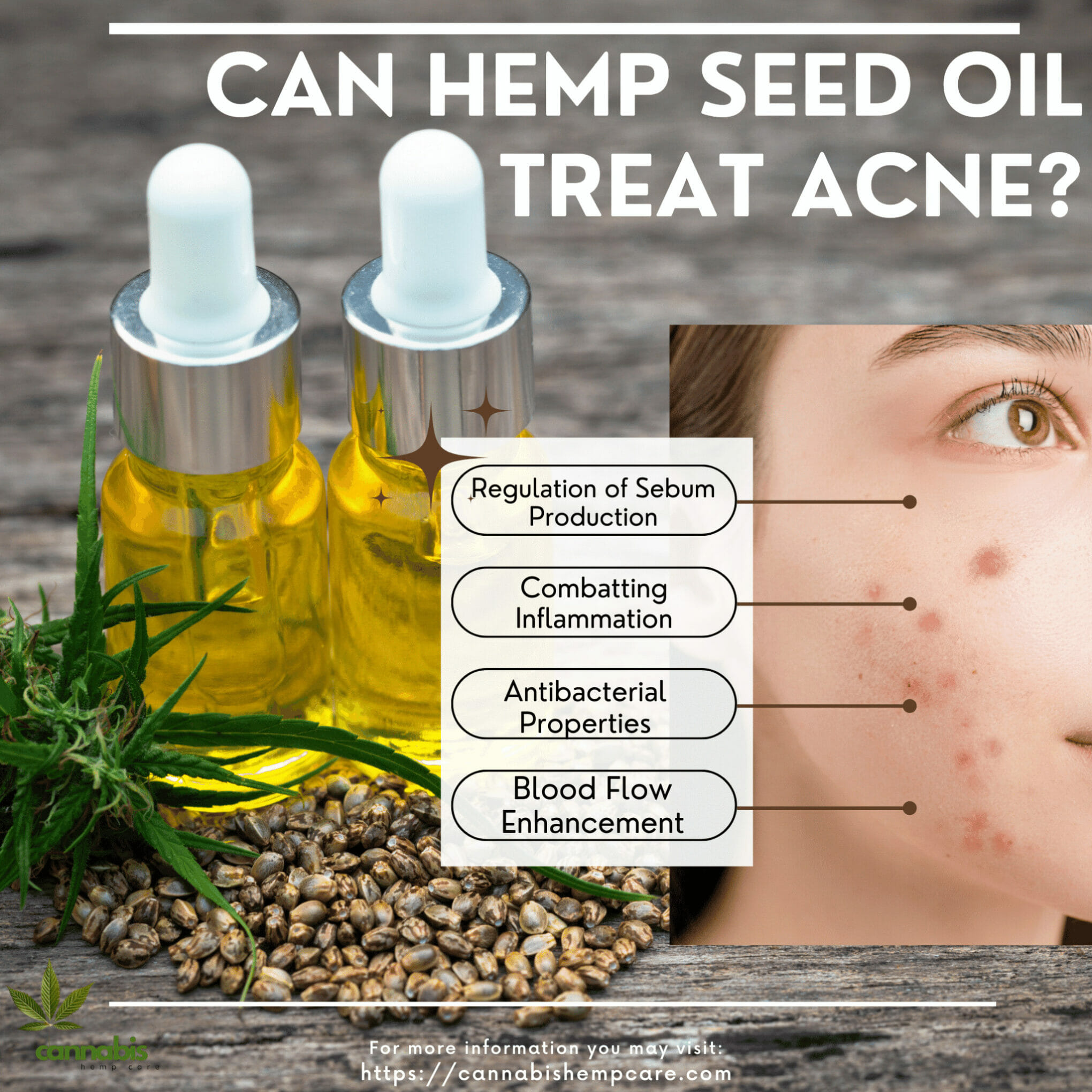
Regulation of Sebum Production
One of the primary culprits behind acne is the overproduction of sebum. Hemp seed oil helps to regulate sebum production3, thereby preventing breakouts and acne. When the oil interacts with the body, it influences our sebaceous glands to moderate the production of skin oils.
The subsequent reduction in oil means a decrease in clogged pores, one of the primary precursors to acne breakouts.
Combatting Inflammation
As previously stated, acne is fundamentally an inflammatory condition. The GLA in hemp seed oil, an omega-6 fatty acid, showcases potent anti-inflammatory effects.
In doing so, it aids in smoothening the skin texture and promoting the growth of new skin cells. This quality is particularly beneficial for those grappling with acne scars.
Antibacterial Properties
The pathogenesis of acne often involves the bacterial strain Propionibacterium acnes. This acne-causing bacteria exacerbates skin inflammation.
Hemp seed oil for acne, with its anti-inflammatory properties, controls three of the main causes of acne: sebum, inflammation, and bacterial infection.
Blood Flow Enhancement
A healthy complexion often ties back to good circulation. Hemp seed oil for acne, being rich in nutrients like vitamin E, can elevate the production of red blood cells. As a result, users might notice a more balanced and even rosy complexion.
Given the compelling evidence and its innate properties, hemp seed oil emerges as an effective natural remedy in the battle against acne.
However, as with all skincare treatments, individual results may vary, and it’s always recommended to perform a patch test or consult a dermatologist before full application.
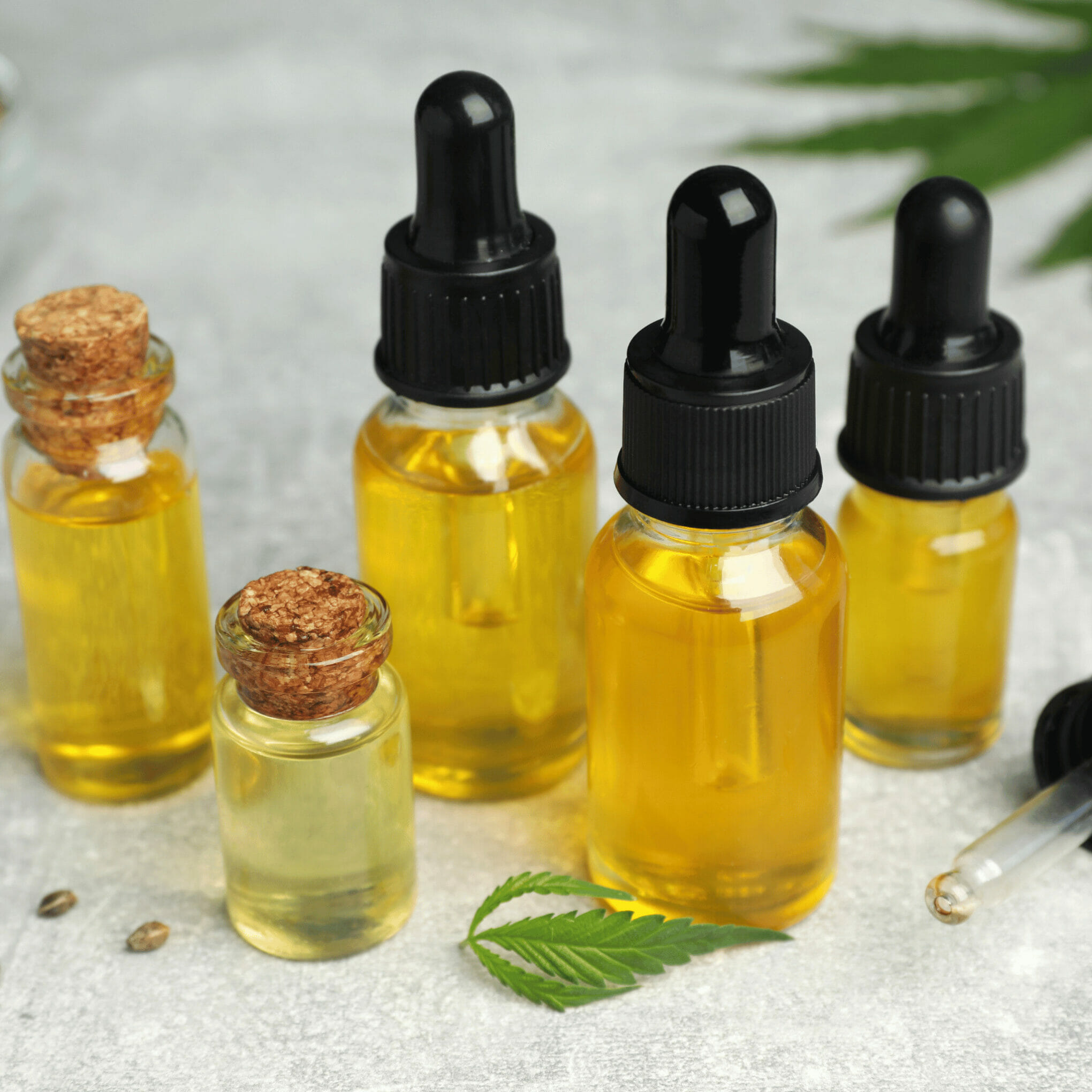
How to Use Hemp Seed Oil on the Acne-Prone Face?
For those with acne-prone skin, it’s a shift from the conventional wisdom of using drying formulas. Hemp seed oil for acne-prone skin offers an alternative approach. By regulating sebum production and promoting blood flow, it provides a holistic remedy.
One can use hemp seed oil for acne in several ways:
- As An Oil Cleanser: Its astringent nature ensures it unclogs pores without stripping the skin of its natural oils.
- As A Moisturizer: After cleansing, apply 2-3 drops on the face for high-speed results.
- Along With Essential Oils: Enhance its potency by combining it with other beneficial oils. This synergy might offer enhanced benefits for acne-prone skin.
Additionally, studies have found dietary hempseed oil to reduce the symptoms of atopic dermatitis, thanks to its rich fatty acid content.
Safety Profile and Recommendations
Hemp seed oil is a good moisturizer for all skin types due to its non-comedogenic nature. However, some might experience mild irritation. It’s always recommended to conduct a patch test before full application.
Moreover, while hemp seed oil contains less than 0.3% THC, it’s crucial to understand that it doesn’t have the psychoactive properties often associated with marijuana.4
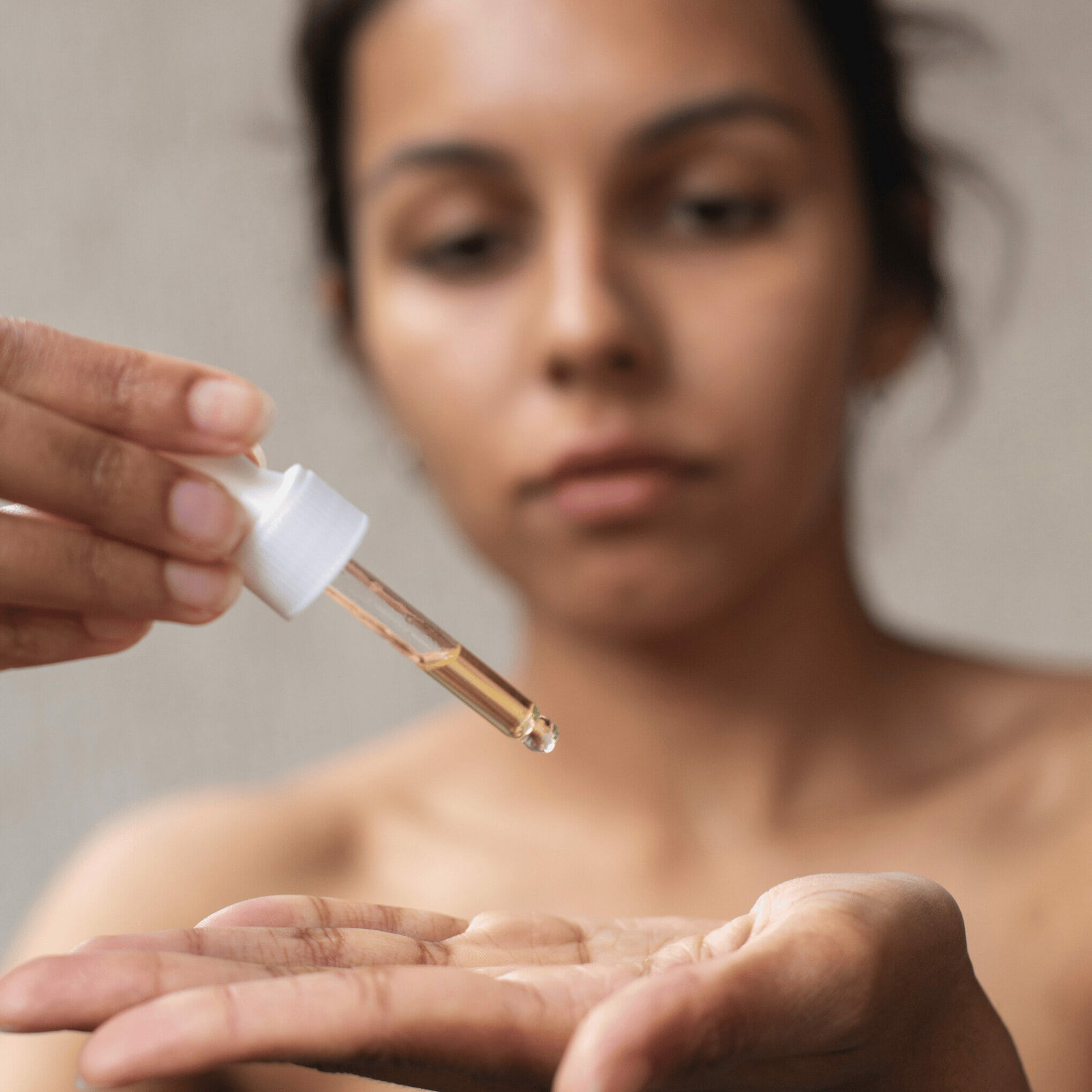
Conclusion
Hemp seed oil, with its rich blend of essential fatty acids and anti-inflammatory properties, presents a promising natural remedy for acne. It effectively treats acne, rejuvenates skin, and even tackles conditions like atopic dermatitis. This “high expectations facial oil” is increasingly being incorporated in cosmetics and body care products due to its myriad of benefits.
In the context of the growing incidence of acne, especially where 85% of people between the ages of 12 and 24 experience it, it’s imperative to seek solutions that not only treat but nourish the skin. With hemp seed oil, the acne-prone demographic has a potent weapon in their skincare arsenal.
According to reports, hemp seed oil’s efficacy isn’t just anecdotal.5 Clinical studies are reinforcing its benefits, making it one of the best treatments for a range of skin conditions.
If you’re aiming to give your skin a healthy glow, prevent breakouts, and repair sun damage, you might want to consider incorporating hemp seed oil into your routine.
For those looking to purchase, ensure that the product is cold-pressed, contains less than 0.3% THC, and is free from contaminants (purification).
FAQs on Hemp Seed Oil for Acne
Can hemp seed oil protect against UV damage?
While hemp seed oil contains antioxidants that can help repair sun damage and reduce UV damage, it shouldn’t be relied upon as a primary sunscreen. It’s beneficial as a supplementary product in a sun protection routine.
Is hemp seed oil pore-clogging?
No, hemp seed oil is not pore-clogging. It has a comedogenic rating of zero, meaning it won’t clog pores.
Is hemp oil or hemp seed oil better for the skin?
It depends on your skin type. Hemp oil is generally recommended for dry skin, while hemp seed oil is better suited for those with oily skin due to its ability to balance sebum production.
Does hemp seed oil cause breakouts?
On the contrary, hemp seed oil can prevent breakouts and acne. It regulates sebum production and has anti-inflammatory properties which reduce the chances of acne formation.
Is hemp oil for skin comedogenic?
No, hemp oil for the skin is not comedogenic. It has a rating of 0 on the comedogenic scale, making it suitable for all skin types without the risk of clogging pores.
Is Hemp Oil Antibacterial?
Yes, hemp oil acts as an antibacterial agent. Its components can help inhibit the growth of bacteria on the skin, making it effective against acne-causing bacteria.
Is hemp oil good for skin problems?
Absolutely. Hemp oil can be beneficial for a variety of skin conditions, including eczema, psoriasis, and dermatitis. It nourishes, moisturizes, and has anti-inflammatory properties that can alleviate symptoms associated with these conditions.
How does hemp seed oil differ from CBD oil in skincare?
Hemp seed oil is extracted from the seeds of the hemp plant and does not contain THC or significant amounts of CBD. It’s primarily known for its moisturizing properties and fatty acid content. On the other hand, CBD oil is extracted from the stalks, leaves, and flowers of the hemp plant and contains cannabinoids, which are believed to offer anti-inflammatory and other therapeutic benefits. Both have unique advantages for the skin, but they serve different purposes in skincare formulations.
Sources
- Top 6 Benefits Of Using Hemp Seed Oil In Your Skin Care. (2022, September 16). Vedix. https://vedix.com/blogs/articles/hemp-seed-oil-benefits-for-skin ↩︎
- Neha. (2022, December 31). How To Use Hemp Seed Oil for Acne Prone Skin. Naturally Happy Mom. https://naturallyhappymom.com/how-to-use-hemp-seed-oil-for-acne-prone-skin/ ↩︎
- Hemp Seed Oil for Acne & Acne Scars. (n.d.). High Beauty. Retrieved September 2, 2023, from https://highbeauty.com/blogs/news/hemp-seed-oil-for-acne-acne-scars
↩︎ - Hemp Seed Oil Benefits for Skin | Hemp Skincare | NIVEA. (n.d.). Www.nivea.com.au. Retrieved September 2, 2023, from https://www.nivea.com.au/advice/men/hemp-oil-for-skin?
↩︎ - Callaway, J., Schwab, U., Harvima, I., Halonen, P., Mykkänen, O., Hyvönen, P., & Järvinen, T. (2005). Efficacy of dietary hempseed oil in patients with atopic dermatitis. The Journal of Dermatological Treatment, 16(2), 87–94. https://doi.org/10.1080/09546630510035832
↩︎

